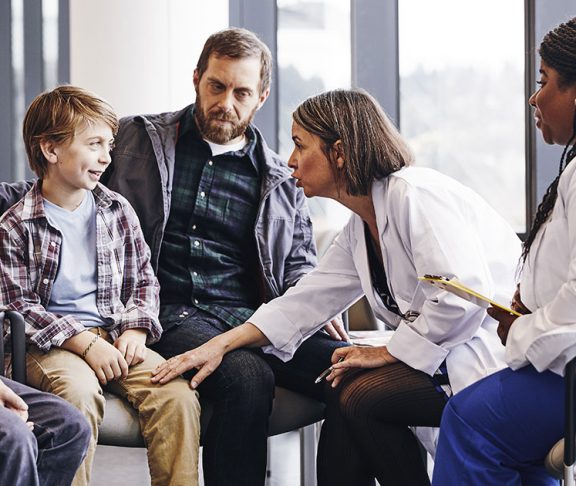An early diagnosis could make a world of difference for people suffering from Duchenne Muscular Dystrophy.
What is Duchenne Muscular Dystrophy
As the head of corporate relations at PTC Therapeutics, Mary Frances Harmon frequently speaks to families affected by Duchenne muscular dystrophy. This is a fatal, progressive rare muscle-wasting disease that impacts boys. It deprives them of their mobility and, ultimately, their ability to breathe.
Most patients never used to live beyond their teen years. However, thanks to awareness efforts and scientific advancements, that is changing.
“I was recently talking to a mom whose son has Duchenne and she was worried about her family’s finances,” Harmon said. “She never thought she would need to save for her son’s college education. But thanks to medical advances, her son is doing great and wants to go to college and become an engineer. He’s planning his future and that’s proof that the boys with Duchenne are now men who are planning their careers and, in some cases, a family of their own.”
Duchenne muscular dystrophy (known as Duchenne or DMD) — the most common and severe form of muscular dystrophy — is a genetic disease that affects 15,000 boys in the United States and 300,000 worldwide. Duchenne is caused by a genetic mutation in the dystrophin gene; this mutation causes progressive muscle degeneration and weakness throughout the body. Currently, there is no cure for Duchenne.
According to the Muscular Dystrophy Association (MDA), Duchenne occurs most often in boys. This is due to dystrophin gene being located on the X chromosome. However, a small percentage of female carriers (about 10 percent) can display symptoms or milder manifestations of the disease.
Duchenne affects all the body’s muscles — skeletal, heart and lungs — and patients depend on an extensive multi-disciplinary care team. They see a variety of specialists to provide ongoing support throughout the journey.
Early diagnosis
When parents and pediatricians see that a child is not achieving developmental milestones like:
- Sitting
- Walking
- Standing up
A CK blood test can be done. Based on the results, a genetic test should be done to help rule out or confirm a diagnosis of Duchenne.
Even though signs and symptoms of the disease can be identified as early as infancy, these signs and symptoms can be overlooked or misdiagnosed. In fact, most boys with Duchenne are not diagnosed until age five.
With an early diagnosis, there’s more potential to identify treatment options that can slow disease progression and preserve the patient’s muscle function as long as possible. “The patient should have preventative medications and therapies added to their care as soon as possible to support longevity and quality of living,” states Robin Geiger, vice president of care and clinical services at MDA.
Treatments
While there’s no cure for Duchenne, new gene-based therapies — using conventional gene replacement strategies, RNA-based technology and other pharmacologic approaches — seem promising for treating the disease. The two main treatment pathways available for Duchenne are medications and supportive care. There are medications that can help to slow down the muscle damage and treat symptoms and supportive care which aim to treat the complications of Duchenne and help improve quality of life.
Additionally, supportive care interventions such as physiotherapy and other rehabilitation can help in maintaining muscle strength as well as maintaining a healthy diet.
With the evolution of anticipatory diagnostics and therapeutic strategies, Duchenne boys are able to lead productive and fulfilling lives.
Life with Duchenne
Advocacy and local support groups can provide practical advice and tips to making everyday life with Duchenne manageable and more enjoyable. Parents often feel overwhelmed and alone, especially when they first learn of the diagnosis; their extended support network becomes invaluable. “It’s important that caregivers make sure that they address self-care needs as well as caring for the patient,” says Geiger.
In addition to the team of physicians — including neuromuscular specialists, cardiologists and pulmonologists — Duchenne patients also need emotional support.
“Recognizing that patients can experience different levels of stress, anxiety and/or depression surrounding their diagnosis. Allowing them to share their feelings would be the strongest effort a loved one can offer,” says Geiger. Geiger explains patients should have professional mental health support, which may include cognitive therapy that involves the family as a unit. Many parents and caregivers depend on family support for everyday help.
If you have questions about MDA services or support, email [email protected] or call 1-833-ASK-MDA1 (1-833-275-6321). For more information, visit mda.org.


